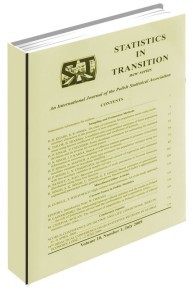Application of iterated filtering to stochastic volatility models based on non-Gaussian Ornstein-Uhlenbeck process
Application of iterated filtering to stochastic volatility models based on non-Gaussian Ornstein-Uhlenbeck processv
Author(s): Piotr SzczepockiSubject(s): Business Economy / Management
Published by: Główny Urząd Statystyczny
Keywords: Ornstein–Uhlenbeck process; stochastic volatility; iterated filtering
Summary/Abstract: Barndorff-Nielsen and Shephard (2001) proposed a class of stochastic volatility models in which the volatility follows the Ornstein–Uhlenbeck process driven by a positive Levy process without the Gaussian component. The parameter estimation of these models is challenging because the likelihood function is not available in a closed-form expression. A large number of estimation techniques have been proposed, mainly based on Bayesian inference. The main aim of the paper is to present an application of iterated filtering for parameter estimation of such models. Iterated filtering is a method for maximum likelihood inference based on a series of filtering operations, which provide a sequence of parameter estimates that converges to the maximum likelihood estimate. An application to S&P500 index data shows the model perform well and diagnostic plots for iterated filtering ensure convergence iterated filtering to maximum likelihood estimates. Empirical application is accompanied by a simulation study that confirms the validity of the approach in the case of Barndorff-Nielsen and Shephard’s stochastic volatility models.
Journal: Statistics in Transition. New Series
- Issue Year: 21/2020
- Issue No: 2
- Page Range: 173-187
- Page Count: 15
- Language: English

